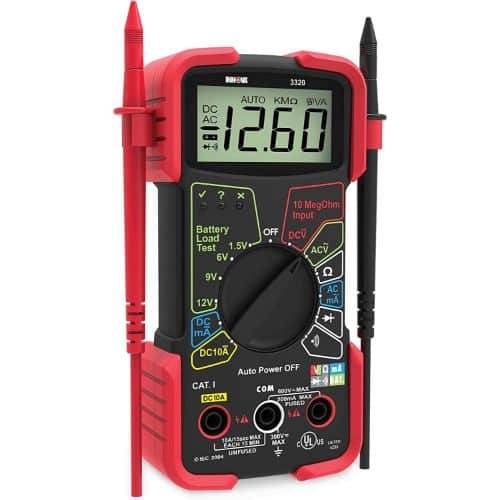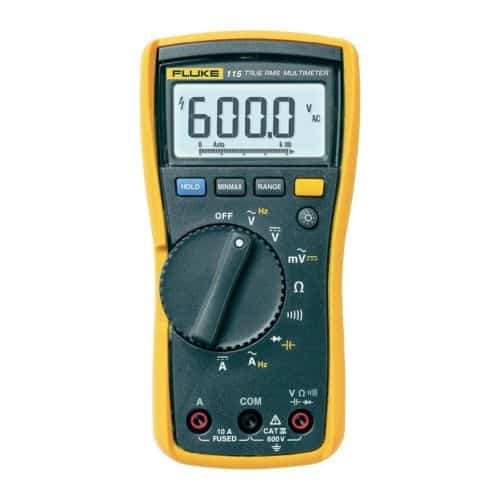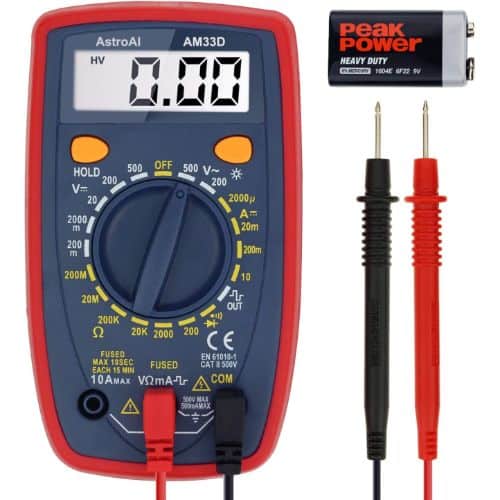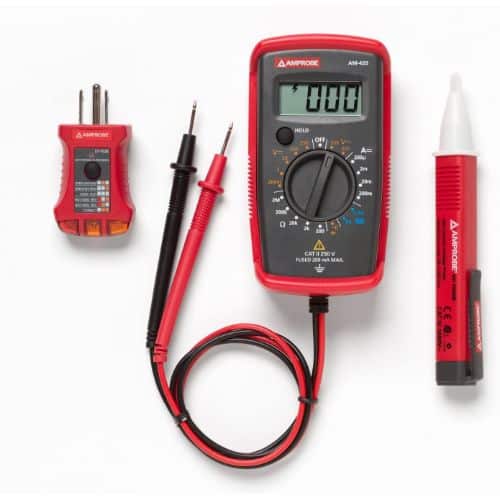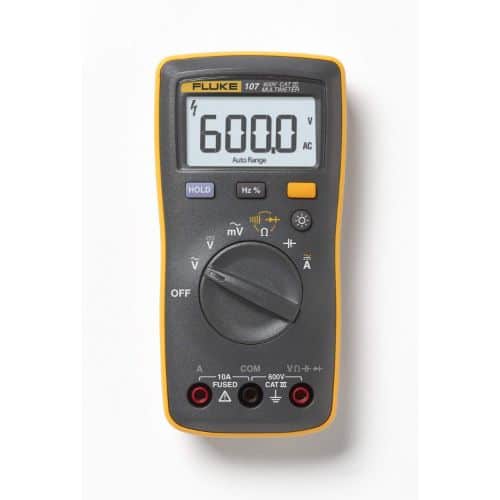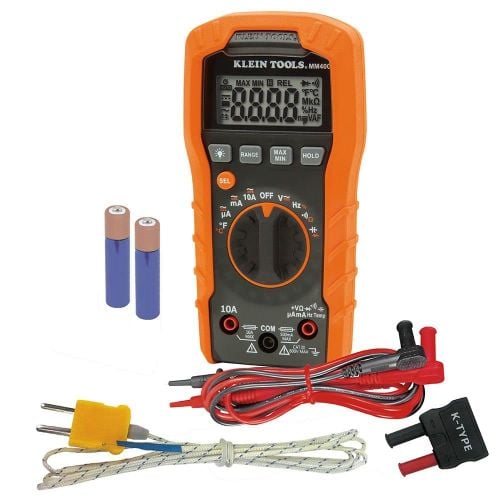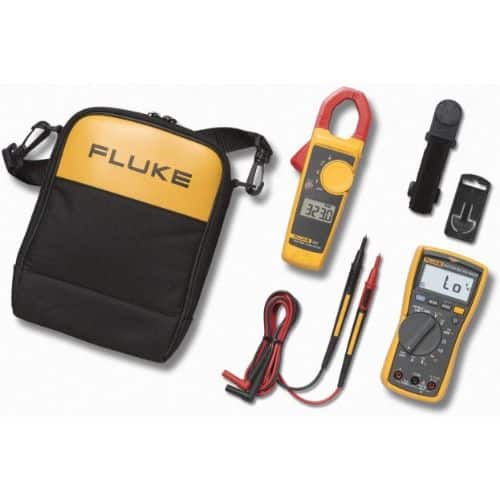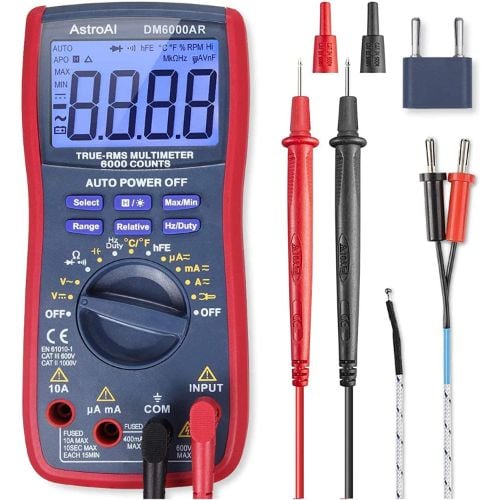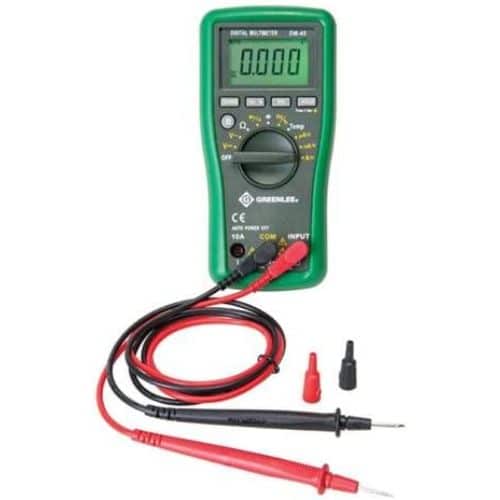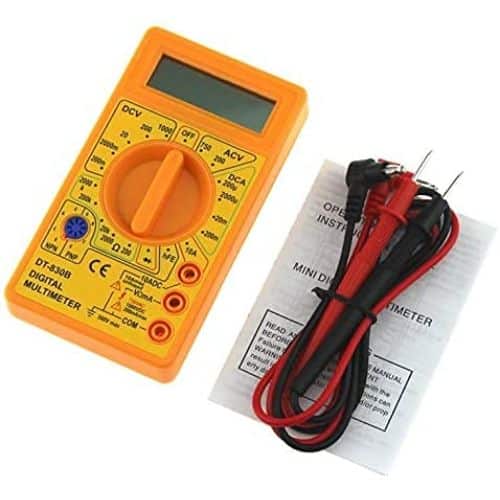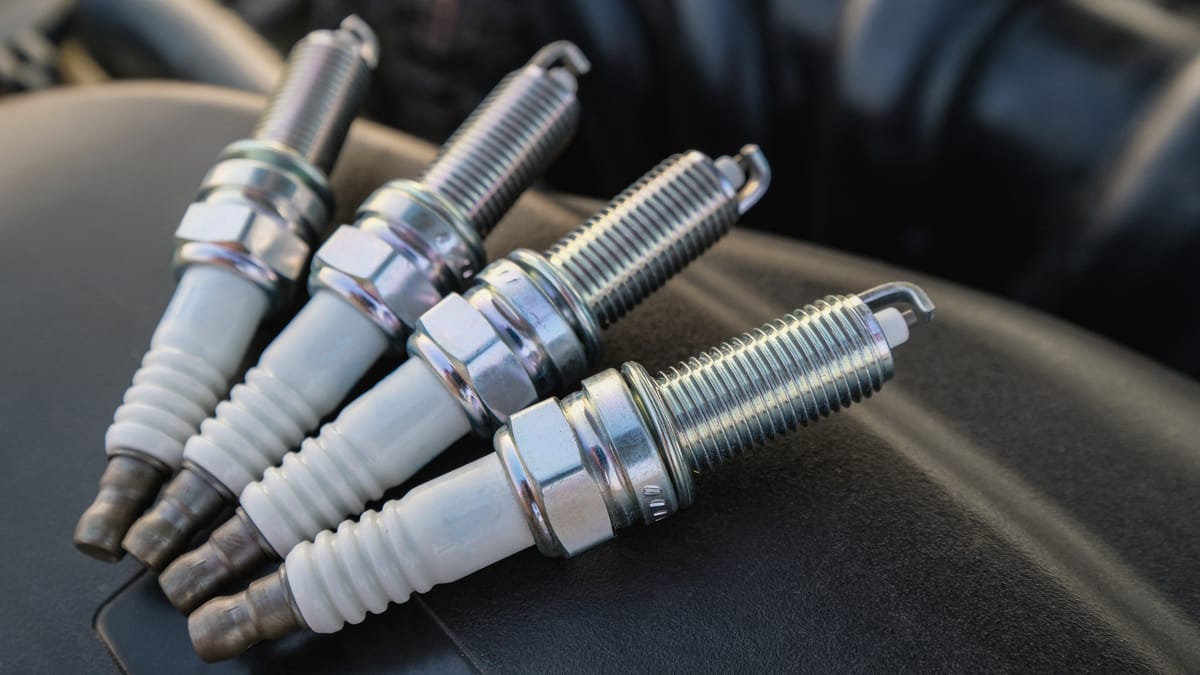If you’re troubleshooting any electrical components, whether it’s in your car or your home, it doesn’t take long until you find yourself needing a multimeter. They’re versatile tools that make it possible for you to figure out what’s happening inside the electrical lines.
But there are tons of multimeters out there, and they don’t all deliver the results you want. And when you’re troubleshooting and diagnosing electrical lines you can’t deal with inaccurate results.
That’s why we took the time to track down and highlight ten of the best multimeters on the market today. With any of the multimeters on our list, you can accurately diagnose various electrical issues and figure out exactly what’s going on with your electrical system.
10 Best Multimeters
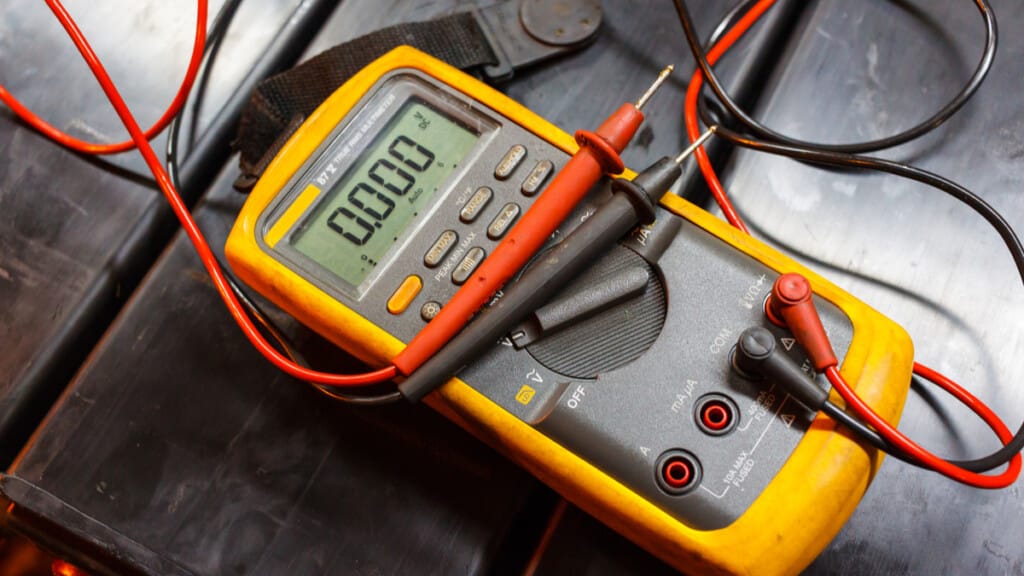
We know you’re busy, and that’s why we wanted to dive right into the multimeter reviews for you here. These are the ten best multimeters you can purchase today, and there are comprehensive reviews with each one.
If you’re still unsure about which option is right for you after the reviews the buyer’s guide after them will walk you through everything you need to know!
1. Innova 3320 – Best Multimeter Overall
If you’re looking for the best multimeter on the market today, then the Innova 3320 is the way to go. Like most multimeters, it has both amperage and voltage readings, and it’s easy to switch to each one by changing the dial and moving the leads.
It comes with built-in auto-ranging features so you can always see the most accurate results but be sure to look at the unit of measurement on the display so you’re not misinterpreting data by mistake. Overall the device can measure up to 600 volts at a time, so you don’t need to worry about shorting it out with too much voltage in most applications.
Add in just how durable this multimeter is and it’s no surprise that it made it to the top of our list even if it doesn’t have a ton of advanced features. It’s an excellent choice for common automotive and household applications, and you don’t need to worry about breaking the bank to get it!
Pros
- A great mix of price and quality
- It has both amperage and voltage readings
- Very easy to use
- Extremely durable design
- Auto-ranging features
- It ranges up to 600 volts
Cons
- It doesn’t have advanced features
2. AstroAI Multimeter 2000 – Best Budget
Just because you’re on a tighter budget doesn’t mean you can’t get a great multimeter. The AstroAI Multimeter 2000 is an outstanding multimeter that you can get without breaking the bank at all. It’s available for an extremely low price and it’s still easy enough for just about any beginner to use.
Moreover, it’s durable, so you don’t have to worry about replacing it after just a few uses. Furthermore, the 500-volt maximum is a bit lower than most other options out there, but 500 volts is still plenty for most home and automotive applications.
But while there’s a ton to love about this multimeter, especially considering the extremely affordable price tag, it is our budget choice for a reason. First, it doesn’t have any advanced features. It’ll work for basic jobs, but if you’re looking for more advanced troubleshooting features this multimeter won’t have it.
Not only that, but you need to be careful using this multimeter for household applications since it doesn’t work with AC voltage. But for automotive and other applications with DC voltage, this super affordable multimeter will get the job done.
Pros
- Very affordable option
- 500-volt maximum
- Very easy to use
- Extremely durable option
Cons
- No advanced features
- Not for AC voltage
3. Fluke 115 – Premium Choice
There’s a reason that Fluke is the number one choice in the multimeter industry. They produce quite a few different options for you to pick from, but their Fluke 115 is one of the best they make. It’s a professional quality tool that you can proudly add to your toolkit, and it’ll do just about anything you could want from a multimeter.
It has a maximum range of 600 volts, and with an auto-ranging feature, you never have to worry about switching settings to get usable results. The Fluke 115 gives some of the most accurate results in the industry no matter what you’re testing, and with a backlit LED display, you never have to worry about being able to read the results, even in low-light situations.
The only real downside to the Fluke 115 is the price. It’s significantly more expensive than what most amateurs want to spend for an at-home tool. But if you need the best of the best for your at-home tool kit or you’re looking to get one for professional purposes, you can’t go wrong with the Fluke 115.
Pros
- Extremely durable option
- Very accurate results
- Professional quality tool
- It ranges up to 600 volts
- LED-backlit display
Cons
- More expensive option
4. Amprobe PK-110
While the Amprobe PK-110 didn’t quite crack our top three, it was a near miss. It’s another option available at a great price considering the quality you’re getting. It’s extremely useful in both automotive and household applications, and it’s extremely easy to use.
It doesn’t have a ton of advanced functions though, and it does max out at “just” 250 volts. While this isn’t a problem for people looking for a multimeter for DIY applications, it could be a problem for professionals.
Overall it’s a compact and versatile multimeter that’s available for a great price, especially considering everything else it comes with.
And that’s the real reason it was able to climb so high on our list. It isn’t because of the multimeter itself but because of two additional tools it comes with. Not only are you getting the great multimeter, but you’re also getting two different types of voltage probes.
One probe plugs straight into a traditional wall outlet to test for power and the other voltage probe is easy to use on just about everything else. Paired with the multimeter it’s never been easier to determine just how much voltage something has.
Pros
- A great mix of price and quality
- It also comes with a voltage probe
- Very easy to use
- Great for automotive and household uses
- Extremely versatile tool
Cons
- No advanced functions
- It maxes out at 250 volts
5. Fluke 107
If you want a Fluke multimeter but don’t want to splurge enough to purchase the Fluke 115, the Fluke 107 might be exactly what you’re looking for. It’s still a more expensive multimeter than every non-Fluke multimeter on our list, but it’s an outstanding deal compared to the Fluke 115.
You still get signature Fluke professional quality readings, and it comes with the same back-lit display for easy reading you can find in the more expensive Fluke options.
Moreover, it has a data hold feature so you don’t have to remember everything while you’re working, and it has a maximum 600-volt range that’s great for almost any application. And because it’s a Fluke multimeter, you don’t have to worry about the durability of this tool at all.
But while the Fluke 107 can outdo most non-Fluke multimeters, there’s a reason it’s not the top Fluke multimeter on our list. That’s because compared to the premium Fluke multimeters you’re not getting the full range of functions, and when you’re spending this much on a multimeter, it’d be nice to be able to do everything you want with it.
Pros
- Extremely durable
- Professional quality readings
- Backlit display for easy reading
- Very easy to use
- 600-volt maximum range
- It has a data hold feature
Cons
- More expensive option
- Limited functions
6. Klein Tools MM400
Klein Tools isn’t the largest name in the multimeter industry, but that doesn’t mean the MM400 isn’t worth checking out. It comes with a CAT III 600 voltage safety rating so you don’t have to worry about whether you’re getting the protection you need, and it even comes with an electrical tester you can use on traditional wall outlets.
Overall, everything about this multimeter is easy to use and with a backlit display, it’s easy to see the results no matter where you’re using it. Even better, it’s an extremely rugged, durable, and long-lasting option, so you won’t need to replace it any time soon.
That’s a good thing though because compared to other multimeters with similar features and quality, you’re spending a bit more on this one. It’s still nowhere near as expensive as a Fluke meter, but you’re also not getting the advanced features those multimeters come with.
You could do far worse than the Klein Tools MM400, but because of the higher price tag for what you’re getting we couldn’t justify putting this multimeter into the top half of our list.
Pros
- CAT III 600 voltage safety rating
- It comes with an electrical tester
- Very easy to use
- Durable and long-lasting option
- It has a backlit display
Cons
- No advanced features
- Slightly more expensive for what you get
7. Fluke 117/323 Combo Kit
Whether you’re a professional automotive worker or a professional electrician, the Fluke 117/323 is the best of the best that Fluke has to offer. Not only are you getting a phenomenal multimeter with the Fluke 117, but it also comes with an amp clamp that makes it easy to measure everything going on inside a line.
Everything with this kit is easy to use, but unless you know what to look for and what the advanced features and readings mean, you might be overpaying for a tool when you can’t fully interpret the results.
This kit can measure non-linear loads and it works great for both AC and DC voltage. You get professional quality results no matter what you’re testing too.
But with all these advanced features from the biggest brand out there, it’s no surprise that the price tag for this multimeter and amp clamp is extremely high. Unless you’re a professional or you plan on using this kit a lot, it’s really hard to justify the higher price tag it comes with.
Pros
- It comes with an amp clamp
- It can measure non-linear loads
- Very easy to use
- It has tons of advanced features
- Professional quality results
- It works on both AC and DC voltage
Cons
- Very expensive option
8. AstroAI Digital Multimeter TRMS 6000
While the AstroAI Digital Multimeter TRMS 6000 fell to the bottom three of our list, it’s not far from making a case for the top choice. It has an outstanding mix of price and functions, allowing you to complete a wide range of diagnostic tasks without spending a ton on a higher-end multimeter.
It comes with a 600-volt rating and uses an auto-ranging feature so you don’t have to worry about changing things around to get extremely accurate results. From there, it’s easy to use and has an LCD-backlit screen so you can always see what’s going on even if there’s not a ton of light around.
Still, while it has all these things going for it, there’s a reason it didn’t make it any higher up on the list. The reason is that it’s not the most durable option. While nothing should happen to it as long as you care for it properly, if you bang it around or drop it too much it won’t last as long as other options.
While this might not sound like a big deal when you’re working in different environments, it’s not uncommon for things to slip off ledges or for you to have a limited amount of space. It’s not a huge deal, but with the AstroAI Digital Multimeter TRMS 6000, you’ll just need to be a little more careful if you want everything to stay in tip-top shape.
Pros
- A great mix of price and functions
- It works up to 600 volts
- LCD-backlit screen
- Easy to use
- It uses an auto-ranging feature
Cons
- Not the most durable option
9. Greenlee DM-45
If you pulled a Greenlee DM-45 out of a random person’s toolbox you’d likely like what you saw. It’s a compact multimeter that’s easy to use and has all the basic features you’d expect from a multimeter.
It has a 600-volt rating so it works in just about any DIY setting and the auto-ranging feature ensures easy-to-read results even if you’re jumping from application to application. Another reason the Greenlee DM-45 is such a great choice is that they make it in the United States.
But while there’s a lot to love about this multimeter, there’s a reason it fell to number nine on the list. First, there aren’t any advanced features with this multimeter. Second, for what you’re getting, the Greenlee DM-45 simply costs a bit more.
Outside of the Fluke multimeters, it’s the most expensive option on our list, and it doesn’t come with the advanced features to justify the higher price tag.
Pros
- Easy to use
- It works up to 600 volts
- It uses an auto-ranging feature
- Made in the USA
Cons
- No advanced features
- Slightly more expensive for what you get
10. White Deer DT-830B
The White Deer DT-830B might be the last multimeter to make our list, but that doesn’t mean it’s not a great choice that’s worth checking out. It’s the most affordable multimeter option on our list, and if you’re on an extremely tight budget but need a basic multimeter, it might be the way to go.
It features an LCD screen that is easy to read, but it’s not backlit like some of the more expensive options. It’s not the most durable multimeter out there, but with an overload protection feature, you don’t have to worry about accidentally hooking it up to too much voltage and frying the system.
Overall it’s a small and compact multimeter that you can get for just a few bucks and store in your RV, vehicle, or garage for when you need it. Just keep in mind that it doesn’t have any advanced features, and it doesn’t give professional-quality results.
It’s fine for checking batteries and other similar activities, but for systems with fluctuating circuits or other advanced features, this multimeter might not give you the extremely accurate results you need.
Pros
- Very affordable option
- LCD screen
- Very small and compact
- It uses overload protection features
Cons
- No advanced features
- Not very durable
- Not professional-level results
Multimeter Buyer’s Guide
Now that you know a little more about ten of the best multimeters you can purchase, it’s time to dive into the details about the best multimeter for you. We’ll dive into some useful tips on how to use your multimeter, break down the differences between AC and DC voltage, and even highlight some of the best possible accessories you can pick up for your multimeter.
Keep reading and we’ll break down everything you need to know to go from a multimeter novice to an electrical guru!
AC vs. DC Voltage
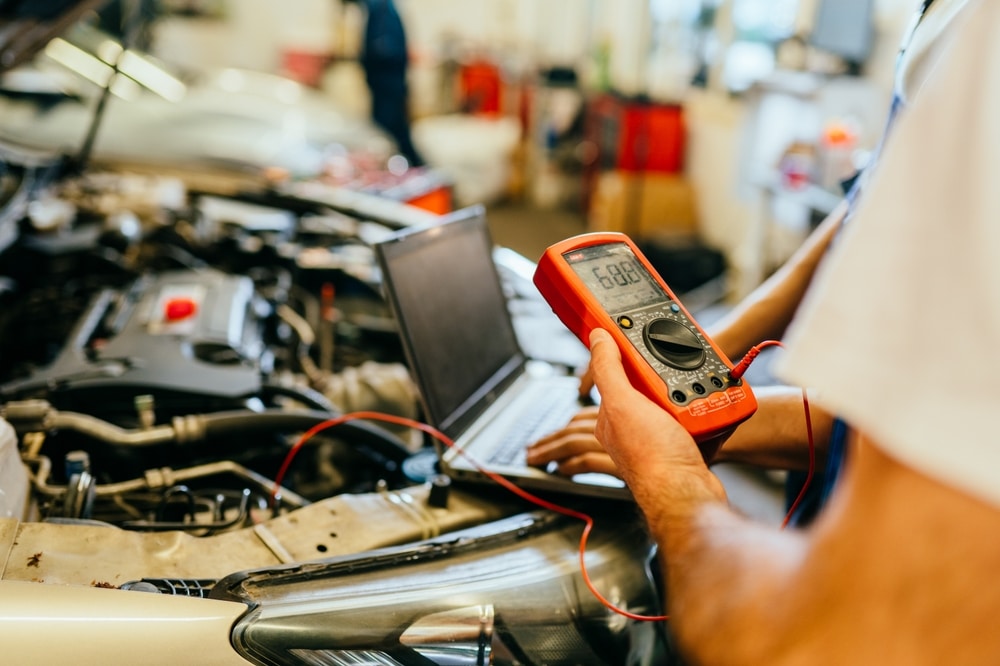
If you’re trying to troubleshoot electrical systems one of the first things you need to figure out is the difference between AC and DC voltage.
The simpler of the two voltages is DC voltage. In a DC voltage system current always travels the same direction. However, the tradeoff to these systems is that they can’t carry a ton of voltage without much larger wires.
This is why DC voltage systems have much lower voltage amounts. Typically, you can find DC voltage in automotive and batteries, and you’ll typically have voltage amounts under 24 volts. Any multimeter you purchase should be able to easily handle any DC voltage system.
AC voltage is “alternating current,” which you can find in typical 110-volt and 220-volt outlets throughout your home. Unlike DC systems where the voltage always travels in the same direction, in AC systems the voltage rapidly alternates the direction it goes.
This allows smaller wires to carry more voltage, which is why it’s so prevalent in homes and other areas where you need higher voltage amounts to power everything. However, AC systems present more of a challenge for multimeters.
Not only do they present higher voltages to read, but since the voltage isn’t always going in the same direction, it can confuse some multimeters and give you inaccurate readings. If you’re planning on using your multimeter on AC voltage, ensure you’re getting a multimeter that can handle it!
Non-Linear Loads
Another thing you’ll need to keep in mind when getting a multimeter is whether any of the systems you plan on testing have a “non-linear” load. These systems use fluctuating voltage as a part of how they work.
These systems usually work on some sort of loop. For instance, they might give off 6 volts for three seconds, 9 volts for three seconds, then 12 volts for three seconds before going back to 6 volts.
These systems can work with the voltage fluctuating after just a fraction of a second, or they can last for several seconds before changing, it all depends on the system. These systems present major problems for lower-end multimeters since they only check the voltage at any given point in time.
However, higher-end multimeters can track these fluctuations and display a chart to show you what’s going on over time. This allows you to accurately track the function of the device and the voltage to figure out what’s going on.
Voltage Ranges
Whenever you’re using a multimeter, you need to take the time to look at the range the multimeter is using when giving you results. There are two ranges a multimeter will use when measuring voltage, millivolts and volts.
Volts is the typical reading for most circuits, and you can tell when it’s displaying volts when the unit of measurement next to the reading is a “V.” However, if you’re dealing with extremely small amounts of voltage the “V” might switch to an “mV.”
This stands for “millivolts.” Each volt consists of 1,000 millivolts, so if you see an “mV” in the unit of measurement range, it’s important to take notice! This is especially true for multimeters that use an auto-ranging feature.
It’s a nice feature since you don’t ever have to worry about switching modes to get accurate results, but if you’re not careful it can lead to you misreading results. This happens when you’re expecting a reading in volts, but there’s only a residual amount of voltage in the system so it switches to millivolts. If you don’t look at the unit of measurement, it’s easy to mix things up!
Helpful Accessories
If you’re getting a multimeter, there’s a good chance you’re going to want a few accessories to make it easier to use in different situations. We’ve highlighted some of the most popular accessories you should consider getting for your multimeter to unlock more features and make it easier to use for different jobs.
Lead Kits
There are tons of lead kits out there, and you should consider getting a comprehensive option like this one to go with your multimeter. Ensure it’s compatible with the multimeter you’re getting, and then spend a little extra money to get an excellent lead kit.
The extra leads ensure you can get a secure connection on a wide range of sockets, plugs, and lines. Getting a secure connection is the only way to get reliable readings, making it easier to get connections in different situations.
A few bucks on a lead kit will save you hours of frustration and ensure you get accurate results. They’re well worth every penny.
Amp Clamps
If you want to use your multimeter to test for amperage, you’ll need an amp clamp to get the job done. They work hand-in-hand with multimeters, and they’re a lifesaver for advanced electrical troubleshooting.
Most DIY electricians don’t need an amp clamp, but if you’re looking to take the next step in electrical troubleshooting and work, an amp clamp is a natural starting point. There are tons of great options out there, but we like this amp clamp by Klein Tools.
Voltage Probes
There are tons of voltage probes out there, and they provide a quick and easy way to tell if a line has power before using your multimeter. Voltage probes come in tons of different shapes and sizes and depending on what you go with they work for various types of electrical circuits.
While you can invest in a standalone voltage probe if you want, the Amprobe PK-110 from our list above comes with two different voltage probes you can use in both automotive and household applications. It’s a nifty feature, although it’s not completely necessary if you already have a multimeter since they can test for voltage too.
Power Probes
This isn’t exactly an “accessory” for a multimeter, but it’s a lifesaver in many electrical troubleshooting applications. These handy devices allow you to power up various devices by applying voltage directly to the device.
When you’re trying to troubleshoot various components like starters, sensors, or just about anything else, a power probe takes all the guesswork out of the situation. You can quickly test the component and rule out that part of the problem.
If the component doesn’t work you know that’s the problem, but if it does you know it’s a problem with the power supply.
There are tons of great power probe options out there, but we really like this one by Clamshell. If you’re doing a lot of electrical troubleshooting, do yourself a favor and pick one up.
Backup Fuses
All right, this isn’t a completely necessary accessory to have, but it’s a good idea to have them on hand. If you’re checking amperage at any point and you forget to switch the leads back to voltage, you’ll blow the fuse on the multimeter.
When this happens you can’t use the amperage function on the multimeter anymore. Having a few extra low-cost fuses on hand ensures that if you accidentally blow the fuse because you forgot to switch things back you don’t lose those features until you can get a new fuse.
If you’re looking to purchase a multimeter it’s only normal to have a few questions. We understand, and it’s why we decided to answer some of the most frequently asked questions about multimeters for you here.
Why Do Fluke Multimeters Cost So Much?
The primary reason Fluke multimeters cost significantly more than the competition comes down to the quality of materials in them and the quality of results. Fluke multimeters give more accurate results and last longer, and that’s why they cost more.
What Are the Three Most Important Things a Multimeter Can Measure?
Multimeters check voltage, resistance, and amperage. The ability to check all three of these things are what separates a multimeter from a simple voltmeter.
What Does OL Mean on a Multimeter?
If the multimeter reads “OL” it means open loop. When this happens on the multimeter it means the circuit you’re trying to test is open and not complete.
Do You Need an AC or a DC Multimeter?
This all depends on what you’re checking. If you’re using your multimeter for automotive purposes are for batteries, you’re using your multimeter to check DC voltage. However, if you’re using your multimeter for household outlets and lines, you need one to check AC.
If you have a multimeter that can check AC voltage it should be able to easily handle DC voltage too.
Now that you know a little more about the various multimeters you can purchase, all that’s left is for you to pick the best one for you. If you’re still a little unsure about which option is right for you, there’s a reason the Innova 3320 is our top choice, and the AstroAI 2000 is an excellent choice for those on a tight budget.
Of course, if you’re a professional, the Fluke 115 might cost a bit more but it’ll deliver the best possible results. What’s important is that you get a multimeter on order so you can use it the next time you’re trying to complete some electrical work!
Categories: Reviews
